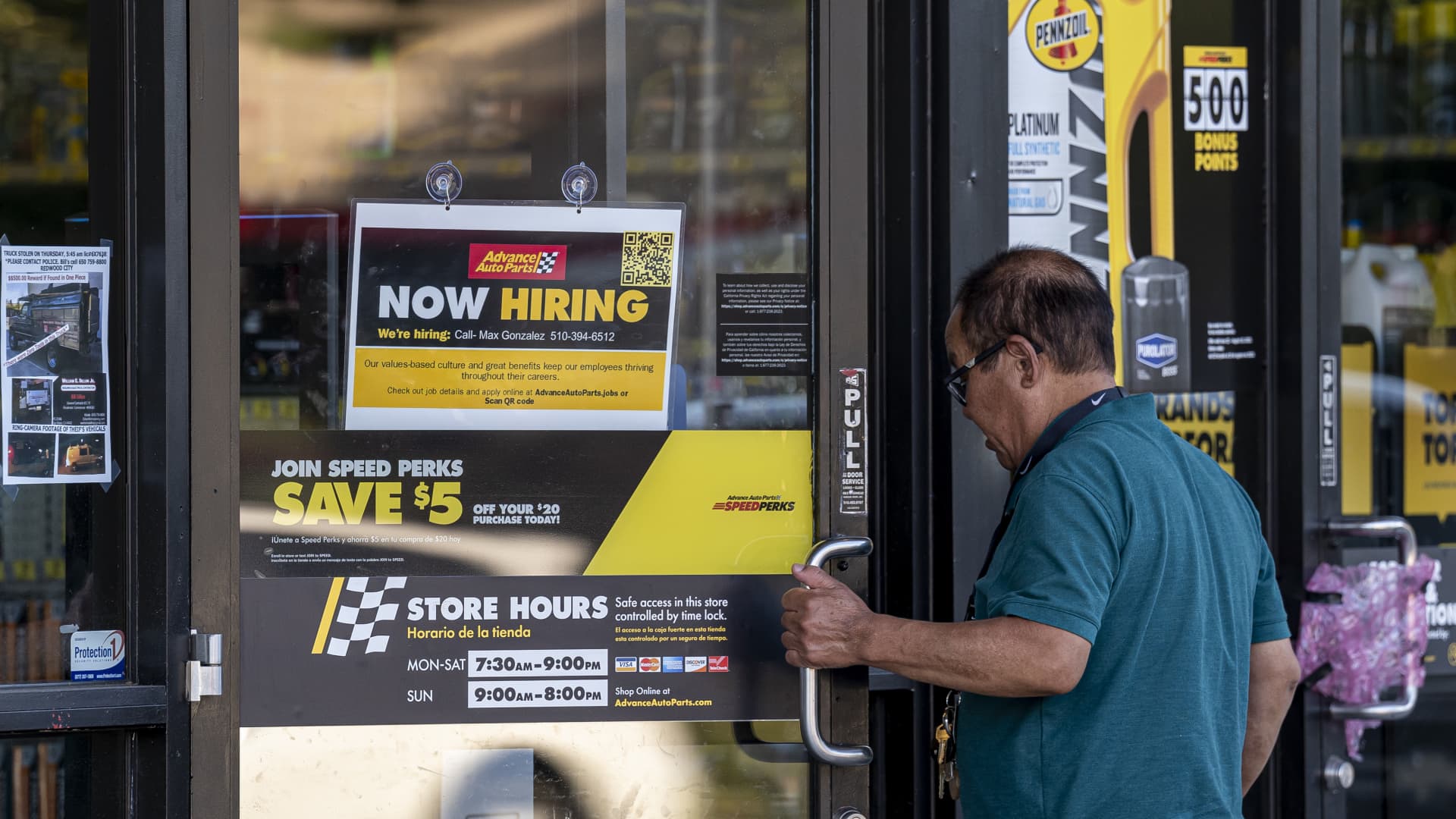A “Now Hiring” sign at an Advance Auto Parts store in San Leandro, California, US, on Tuesday, Aug. 15, 2023.
David Paul Morris | Bloomberg | Getty Images
This report is from today’s CNBC Daily Open, our new, international markets newsletter. CNBC Daily Open brings investors up to speed on everything they need to know, no matter where they are. Like what you see? You can subscribe here.
What you need to know today
Job creation slowed
Job growth in the U.S. slowed to 177,000 in August, according to payroll company ADP. That’s fewer than economists’ expectation of 200,000 — which is itself already much lower than July’s downwardly revised 371,000. It’s a sign the effects of high interest rate are starting to be felt, giving traders hope the Federal Reserve might pause hikes.
Markets regain ground
U.S. stocks rallied Wednesday on the back of weaker-than-expected economic data. The S&P 500’s on a four-day winning streak, helping it to regain some of August’s losses. The regional Stoxx 600 index in Europe closed 0.2% lower. Separately, Germany reported a 13.2% year-on-year drop in import prices for July, while Spain’s flash inflation reading for August was 2.6%, in line with expectations.
Big bond losses for BoE
The Bank of England is facing heavy losses on its bond purchases, according to Deutsche Bank. The losses are largely because of rapidly rising interest rates, which drive up bond yields and, conversely, push down bond prices. In late July, the central bank estimated that it would require the U.K. Treasury to backstop £150 billion ($189 billion) of losses on its asset purchase facility.
Salesforce’s income popped
Salesforce shares jumped as much as 6% in extended trading after the firm reported second-quarter earnings that beat expectations. Revenue rose 11% from a year earlier to $8.6 billion while net income surged from $68 million to a staggering $1.27 billion. Salesforce also lifted its revenue forecast for the year. The company’s cost cutting and layoffs paid off, literally.
[PRO] A bitcoin ETF is not a done deal
Grayscale, a crypto asset manager, won its case against the Securities and Exchange Commission, which denied the company from converting its bitcoin trust into an ETF. Investors are hoping the ruling will open the floodgates to bitcoin ETFs from companies like BlackRock, Fidelity and Invesco. While undeniably a seminal moment for bitcoin, analysts warn that it’s still too early to celebrate.
The bottom line
Bad news is good news again for markets.
Markets last week were gripped by the fear that interest rates will remain high — or go even higher than they already are — in the face of an unyieldingly strong economy and stubborn inflation. (Recall how the 10-year Treasury yield, which typically reflects rate expectations, hit a 16-year high last week.)
Those worries dissipated somewhat Wednesday.
New data showed that economic growth, while still hot enough to suggest a soft landing, was not quite as scorching as previously thought. Second-quarter gross domestic product the U.S. was revised downwards from 2.4% to 2.1% on an annualized basis.
Moreover, job creation for August was lower than expected. In another encouraging sign that inflation might be moderating, pay growth for workers slowed, regardless of whether they changed jobs or stayed in their current positions, according to ADP.
“This month’s numbers are consistent with the pace of job creation before the pandemic,” Nela Richardson, chief economist at ADP, said in a press release. “After two years of exceptional gains tied to the recovery, we’re moving toward more sustainable growth in pay and employment as the economic effects of the pandemic recede.”
In sum, there’s hope the Federal Reserve might loosen its grip on monetary policy, based on the weaker-than-expected economic data. Markets cheered the news.
The S&P 500 rose 0.38%. It might seem a small figure, but it’s statistically significant for a few reasons: One, it gives the index a four-day winning streak; two, it helped the index close above 4,500, breaking a key psychological barrier; three, it helped to trim August’s losses to around 1.6%, down from an intraday low of 5.53% on August 18. The Dow Jones Industrial Average inched up 0.11% and the Nasdaq Composite climbed 0.54%.
For tomorrow, look out for the personal consumption expenditures index, which measures how much consumers spent in July. If inflation numbers come in soft, then that completes the trifecta of data — economic growth, jobs and inflation — that the Fed wants to see slow down. Then markets can probably heave a sigh of relief, for now.






More Stories
Armed men gun down 23-year-old Ecuadorian model in broad daylight – Times of India
Islamic Jihad commander killed in Rafah, says Israeli army – Times of India
‘Canada is a rule-of-law country’: Trudeau after arrest of 3 Indians in Nijjar murder case – Times of India